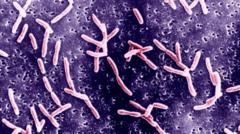Pune, India is facing an outbreak of Guillain-Barré Syndrome (GBS), with around 160 reported cases since January. Investigations suggest a link to the Campylobacter jejuni pathogen, typically found in undercooked poultry. Public health measures, including community awareness and surveillance, are being implemented as medical professionals race against time to manage the crisis.
Outbreak of Guillain-Barré Syndrome in Pune, India: A Cause for Concern

Outbreak of Guillain-Barré Syndrome in Pune, India: A Cause for Concern
A concerning rise in Guillain-Barré Syndrome (GBS) cases linked to Campylobacter jejuni raises alarms in Pune, India, highlighting challenges in public health response.
In the bustling city of Pune, India, a rare yet alarming outbreak of Guillain-Barré Syndrome (GBS) has emerged, leaving the local healthcare system under significant strain. The first signs appeared when a six-year-old boy struggled to hold his pencil, initially perceived as a typical angry reaction to homework. However, what unfolded was a dire case of GBS—a neurologic disorder where the body's immune system erroneously attacks nerve cells, resulting in severe muscle weakness and paralysis.
Since January of this year, approximately 160 cases of GBS have been reported in Pune, an essential hub for education and information technology. Tragically, authorities suspect that five individuals have succumbed to the syndrome through this alarming development. Currently, 48 patients remain in intensive care, with 21 requiring ventilator support, while 38 have successfully been discharged.
Typically, GBS starts with initial symptoms like tingling or numbness in the extremities, followed by progressive muscle weakness within two to four weeks. The severity of GBS can vary, contributing to a mortality rate that fluctuates between 3 and 13%, heavily dependent on available healthcare services.
Investigators are tracing this outbreak to Campylobacter jejuni, a common pathogen responsible for foodborne infections and a significant contributor to GBS cases globally. This correlation was first documented in the 1990s and has since been increasingly observed worldwide. In an unsettling parallel, Peru also reported over 200 suspected GBS cases linked to Campylobacter within the first half of 2023, prompting a national health crisis response.
Health experts believe that specific strains of Campylobacter—specifically those with certain molecular characteristics—can mimic the structure of human nerve cells, leading to the immune system's misdirected attack, a phenomenon known as molecular mimicry. Although the probability of developing GBS after Campylobacter infection remains low, risk factors suggest that environmental conditions in Pune may have contributed to the current outbreak.
With inadequate diagnostic tools available, the complexity of accurately identifying GBS exacerbates the public health crisis. Current therapeutics aim to mitigate symptoms through blood filtration processes, alongside administering antibodies that counteract the harmful immune response. As doctors and health workers grapple with the situation, educational efforts are underway to encourage locals to boil their water and avoid undercooked food.
The ongoing response involves extensive surveillance, with official teams having inspected over 60,000 households and collecting numerous water samples for analysis. During such uncertain times, health officials urge residents to remain calm while addressing sanitation practices. The potential link between this outbreak and environmental hygiene underlines a dire necessity for improved public health systems to combat future threats effectively.




















